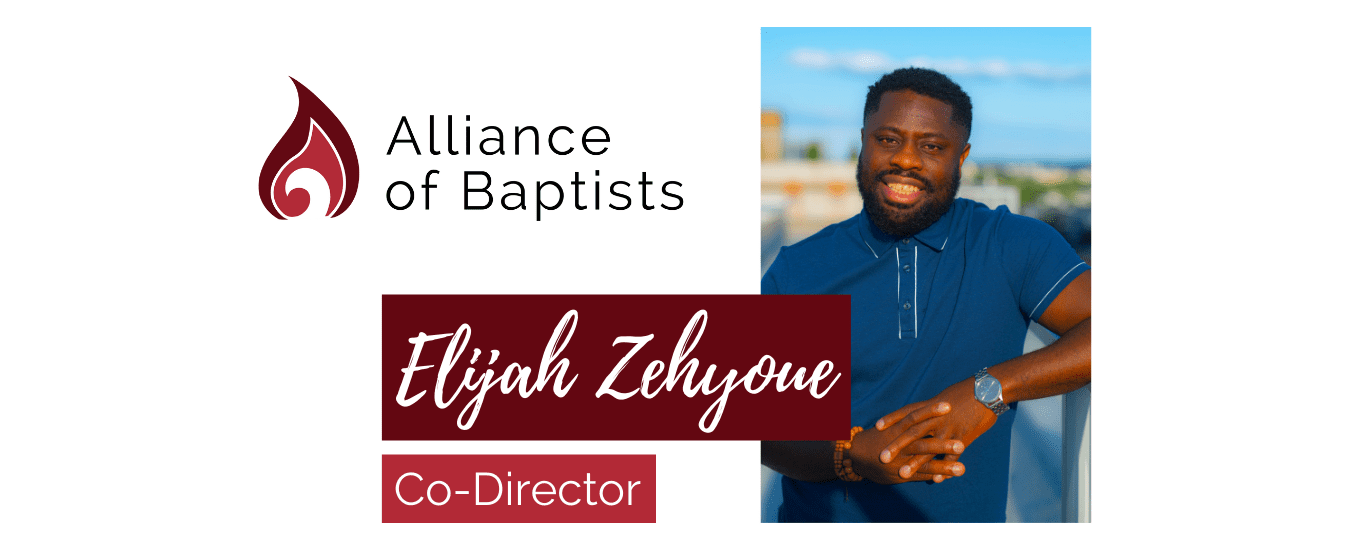After a broad search, the Alliance of Baptists has called Reverend Elijah Zehyoue to become its next co-director following the retirement of Paula Clayton Dempsey, director of partnership relations. On October 15 Paula’s retirement takes effect and Elijah will begin his new role, joining Carole Collins, director of operations and finance, in leading the staff team. Carole said, “I welcome him to this exciting and sacred work. And I am grateful to be on this Alliance journey with him.”
The search committee, made up of April Baker, Nashville, Tenn., Christine Wiley, Fort Washington, Md., GJ Tarazi, McLean, Va., Erica Saunders, Oberlin, Ohio, Cristina Garcia-Alfonso, Raleigh, N.C., and Ben Boswell, Charlotte, N.C., unanimously recommended Elijah to the Alliance Board of Directors who enthusiastically accepted the recommendation.
Elijah Zehyoue, a graduate of Morehouse College (B.A.) and the University of Chicago (M.Div.), has served as associate pastor at Alliance congregational partner Calvary Baptist Church in Washington, D.C. since 2014. He brings to the leadership role experience as a pastor, preacher, scholar, and teacher. He is in the dissertation writing phase of a Ph.D. in African History at Howard University where he studies the Trans Atlantic Slave Trade and the Origins of the Liberian Civil War. Himself an immigrant from Liberia, Elijah’s family came to the U.S. to escape that country’s civil war.
Alliance President Michael-Ray Mathews noted, “In Elijah, we gain the care of a pastor, the rigor of a scholar, and the passion of a prophet. I look forward to partnering with Carole and Elijah as they lead us all in the continued work of cultivating a theological home and prophetic community for an ever-emerging Alliance.”
The Alliance has been fully engaged in implementing its commitment to become an antiracist organization. Elijah gave voice to his own commitment toward that goal, saying, “I preach based off of the belief that through particular modes of analysis, especially applied to our spiritual lives, we can truly make our world a better place. I believe this will benefit the Alliance of Baptists because I can collaborate with and empower our many talented preachers and ministers to continue the good work they are doing preaching a liberating message. I can offer more resources to them out of my own tradition, knowledge, and connections so that they feel equipped to go even further in their antiracist ministries and commitments.”
Paula Clayton Dempsey remarked, “I am grateful for how the Spirit of God has been at work in the life of Elijah and in the Alliance to bring us to this moment. I have great confidence in his capable leadership as he and the organization are guided by the Spirit.”
Founded in 1987, the Alliance of Baptists formed in order to provide a space for individuals who were tired of political infighting within the Southern Baptist Convention. As the organization’s story unfolded, the Alliance would come to provide a theological home for Baptists and Christians from across many denominational groups. Throughout the Alliance’s history, the organization has been outspoken on a number of state, national, and global justice issues. In 1990, the Alliance of Baptists offered the first apology from any Baptist organization in the South for the sins of slavery. Since this apology, the organization has proclaimed its support for issues including marriage equality, #Blacklivesmatter, ecological justice, gun-control reform, justice in Palestine, food justice, interfaith dialogue, and more. (Reimagining Zion: History of the Alliance of Baptists, Andrew Gardner, Nurturing Faith Inc., 2015)
Expressing his own approach to engaging the mission of the Alliance, Elijah said, “I am of the belief that to be in the liberating tradition of Jesus means to struggle against oppression whenever and wherever it is present. This work puts me in solidarity with marginal people all over the world—whether students in Palestine, migrants in Central America, exploited workers in Southern Africa, or LGBTQIA+ people globally. My position as an oppressed Black Immigrant is my lens for understanding the suffering of so many other people around the world. I believe the call of the church is to work to end suffering in the world and that much of how we do that is to stand in solidarity with those people struggling for justice wherever they are.”




Recent Comments